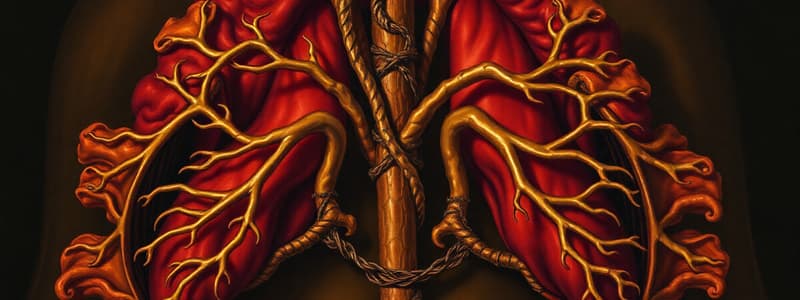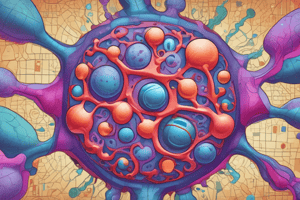Podcast
Questions and Answers
Which of the following are primary lymphoid organs?
Which of the following are primary lymphoid organs?
- Lymph nodes and spleen
- Thymus and lymphoid nodules
- Red bone marrow and thymus (correct)
- Lymphoid nodules and spleen
What is the key difference between lymphoid nodules and lymphoid organs?
What is the key difference between lymphoid nodules and lymphoid organs?
- Lymphoid nodules are smaller than organs.
- Lymphoid nodules are encapsulated, while organs are not.
- Lymphoid nodules lack a capsule, unlike organs. (correct)
- Lymphoid nodules contain only B cells, while organs contain T cells.
What structure allows lymph fluid to enter a lymph node?
What structure allows lymph fluid to enter a lymph node?
- Efferent vessels
- Trabeculae
- Afferent vessels (correct)
- Cortex
Which of the following is NOT part of the innate immune system’s first line of defense?
Which of the following is NOT part of the innate immune system’s first line of defense?
What is the primary function of white pulp in the spleen?
What is the primary function of white pulp in the spleen?
Which lymphoid organ filters blood and removes old or damaged red blood cells?
Which lymphoid organ filters blood and removes old or damaged red blood cells?
Which component of innate immunity is responsible for killing abnormal cells and pathogens by directly contacting them?
Which component of innate immunity is responsible for killing abnormal cells and pathogens by directly contacting them?
What happens to the thymus after puberty?
What happens to the thymus after puberty?
What is the primary role of phagocytes in the immune system?
What is the primary role of phagocytes in the immune system?
Which immune cells are specifically involved in adaptive immunity?
Which immune cells are specifically involved in adaptive immunity?
What function does the spleen serve regarding red blood cells?
What function does the spleen serve regarding red blood cells?
Which immune response involves antimicrobial substances and inflammation?
Which immune response involves antimicrobial substances and inflammation?
What is the primary function of the thymus?
What is the primary function of the thymus?
What do lymph nodes primarily filter?
What do lymph nodes primarily filter?
Which immune cells are directly involved in killing infected or cancerous cells?
Which immune cells are directly involved in killing infected or cancerous cells?
What is NOT a function of innate immunity?
What is NOT a function of innate immunity?
What structure covers the thymus and separates it into lobules?
What structure covers the thymus and separates it into lobules?
Which type of lymphoid tissue is primarily found surrounding the central artery in the spleen?
Which type of lymphoid tissue is primarily found surrounding the central artery in the spleen?
Flashcards are hidden until you start studying
Study Notes
Lymphoid Organs and Immune Responses
- Primary lymphoid organs include red bone marrow and thymus.
- Lymphoid nodules are smaller, lack a capsule, and differ from lymphoid organs which are encapsulated.
- Afferent vessels allow lymph fluid to enter lymph nodes; efferent vessels enable lymph to exit.
Innate Immune System
- The first line of defense includes skin, mucus, and cilia; it does not include phagocytes.
- The innate immune system's second line involves antimicrobial substances and inflammation.
- Important innate immune cells like Natural Killer (NK) cells directly kill abnormal and infected cells.
Thymus Functionality
- Located in the mediastinum, anterior to the heart, the thymus matures T cells.
- Post-puberty, the thymus atrophies, leading to decreased T cell production.
Spleen Structure and Function
- The spleen filters blood, removing old and damaged red blood cells, primarily through red pulp.
- White pulp of the spleen houses immune cells like B and T cells for immune functions.
- Thymic corpuscles in the thymus contain keratin; their specific function remains unclear.
Lymph Nodes and Their Role
- Lymph nodes filter lymph fluid, removing foreign particles, and are not responsible for producing antibodies.
- They contain primarily B cells and T cells in their white pulp.
Adaptive Immunity
- Adaptive immunity involves the production of antibodies and memory cells, providing lasting protection against pathogens, unlike the immediate response of innate immunity.
Summary of Key Aspects
- Innate immunity does not include antibody production; functions include inflammation, fever, and phagocytosis.
- The thymus is covered by a capsule and trabeculae, which separate it into lobules.
- Red pulp contains macrophages, which phagocytize old red blood cells and pathogens, while lymph fluid enters lymph nodes through afferent vessels.
Studying That Suits You
Use AI to generate personalized quizzes and flashcards to suit your learning preferences.




